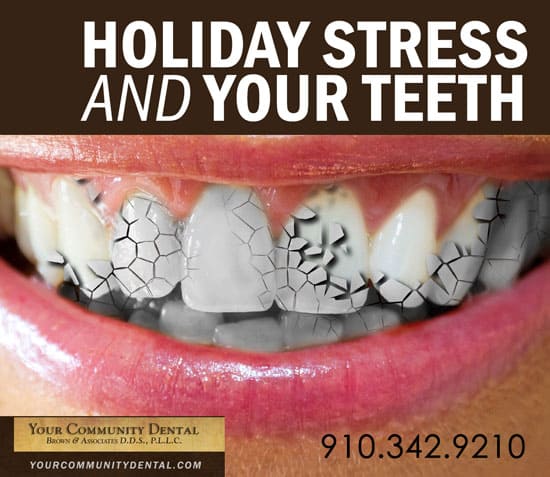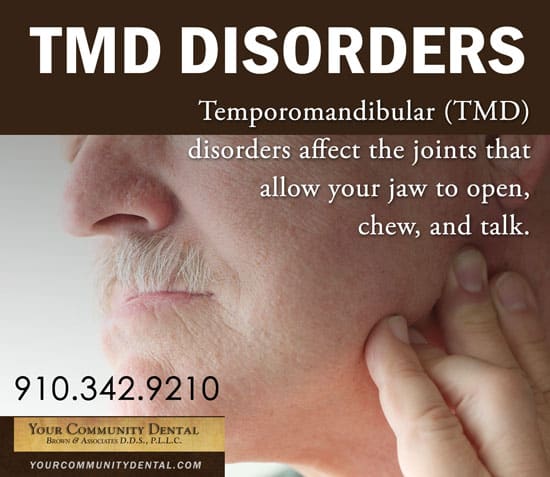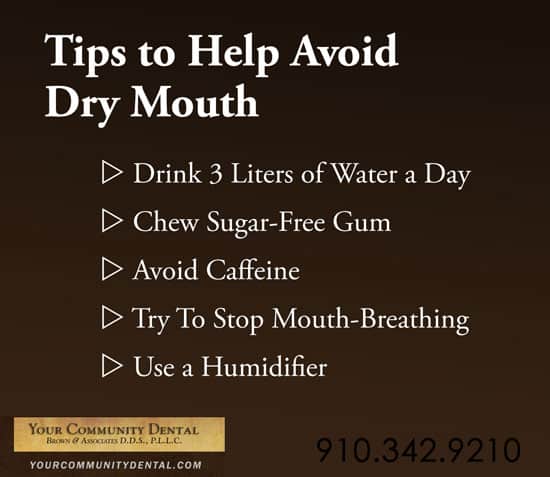Holiday Stress Can Do a Number On Your Teeth!

As we approach what is supposed to be the most wonderful time of the year, you may be finding that it also might be the most stressful time of the year. Between balancing the responsibilities of scheduling multiple holiday gatherings between friends and family, making travel plans, and finding the time to survive overcrowded shopping malls and wrap gifts, Your Community Dental knows that you are busy. Planning and executing the perfect holiday season, deciding what gifts to buy for all the loving people in your life, or mentally preparing for extended family to visit can be extremely stressful, even if the end result is gratifying and a delightful time.
Like so many others this season, if your to-do list is only growing instead of shrinking, you may find that you are actually taking out the brunt of your stress on your teeth. Excessive amounts of stress not only impact your mental health, but also your physical well-being, which, unfortunately, does not exclude your teeth. No one wants oral pain to put a damper on their holiday festivities; instead of jingling all the way to the dentist, knowing what the effects of stress are on your teeth and working to curb those stress triggers will keep you and your teeth happier and healthier.
When your holiday grind is too much:
Did you know that you could be wearing down your teeth without even knowing it? Stress can cause what is technically termed bruxism, but more commonly known as grinding your teeth. Most people clench their jaw or occasionally grind their teeth, but bruxism means that you are doing it so much to the point that it’s affecting your teeth and oral health. Constantly grinding your teeth and clenching your jaw causes your enamel to gradually wear away, which results in your teeth developing flat tips and becoming increasingly sensitive.

Symptoms of teeth grinding also include:
- Dull headaches
- Worn tooth enamel
- Jaw tenderness
- Sensitive teeth
- Excessive wear on teeth
Although grinding most often occurs in your sleep, you can also find yourself consciously or unconsciously grinding your teeth throughout the day.
If you suspect you are grinding your teeth or experiencing these symptoms, a visit to the dentist can make all the difference. Chronic teeth grinding can result in teeth fracturing, wearing teeth down to mere stumps, or even losing your teeth. Grinding also affects your jaw, which can cause or worsen TMD or even change the shape of your jaw. Serious dental work may be needed if chronic teeth grinding is left untreated.
Fortunately, by talking to your dentist about your teeth grinding, you can find ways to treat the issue. Your dentist can fit you with a mouth guard to wear as you sleep to prevent teeth grinding. If you and your dentist determine that stress is causing your teeth grinding, you can also make plan to reduce your stress levels. This could mean:
- Cutting back on caffeine
- Avoiding alcohol, which increases grinding after consumption
- Not allowing yourself to mindlessly chew on pencils or gum
- Training yourself not to grind by putting your tongue between your teeth to relax your jaw muscles
Addressing your stress head-on could make all the difference in your teeth’s health this holiday season. Perhaps you can pass on some of those to-do list items to another family member or simply take a few minutes each day to decompress to lower your stress and chances of teeth grinding.
“All is calm, all is quiet…”—because your jaw might be locked from TMD!
When the holidays hit and all at once you are around every family member from your grandmother to a twice-removed cousin, your stress level invariably rises. Whether your family is behaved and organized or puts the “fun” in dysfunctional, it can be a lot for everyone to get together and meet all tradition expectations, schedules, and needs. If you find your child in the midst of a gift-opening war, making the ultimate sibling go-to move to bite their sister only to yelp as their jaw clicks and locks, your child may be experiencing TMD.
Temporomandibular (TMD) disorders is a joint disorder in the jaw that effects all ages. It is caused from the joint becoming injured and damaged, and causing localized pain in the jaw. TMD can be an effect of stress, but also linked to teeth grinding, misalignment of the jaw, and gum chewing. The persistent pain and clicking from TMD affects the joints that allow your jaw to open, chew, and talk.
Signs and symptoms of TMD include:
- Pain in the jaw
- Hearing and feeling jaw clicking and popping
- Ear pain and aches
- Stiff and sore jaw muscles
- Migraines and headaches
- Jaw muscles locking
TMD has a few home remedies to lessen pain and relax the injured joint muscle, such as applying ice packs to the joint or gentle massages and stretches of the jaw and neck. Avoid aggravating the joint from heavy chewing like crunching on ice or hard candies, like candy canes. Like teeth grinding, stress reduction is an important component of treating TMD, as stress increases muscle tension and clenching of the jaw.
If you think you might have TMD or self-care is not fully addressing the pain, your dentist can provide nonsteroidal anti-inflammatory drugs or prescription medications, dental splits, Botox injections, or physical therapy. Only extreme, rare cases call for surgery.

Don’t get dry mouth under the mistletoe this year:
This condition is exactly what it sounds like; it’s when you experience the sensation of having a dry mouth. It’s hard to pinpoint a definitive cause for dry mouth, but it has been linked to stress. Stress is difficult enough as is, and dry mouth is yet another effect stress can take out on your mouth.
Dry mouth is the cause of an absence or reduction of saliva due to the salivary glands not producing enough saliva to keep your mouth wet. It is associated with several symptoms:
- Difficulty swallowing and chewing
- Taste changes
- Dry tongue
- Sore throat
- Burning sensation of the mouth
- Hoarseness or dry nasal passages
- Trouble speaking
There are a number of issues that can lead to dry mouth, but stress in combination with mouth-breathing and dehydration can cause it to become more severe. The decrease in saliva due to dry mouth makes it more difficult for saliva to break down food and bacteria particles on your teeth, negatively affecting your teeth and gum health with an increase in plaque, tooth decay, and gum disease. Dry mouth can also affect your digestion, appetite, and enjoyment of food.
The best gift this season is a beautiful smile!
If you are experiencing teeth and jaw issues that you believe are related to stress, reach out to Your Community Dental today. Stress might be inevitable during the holidays, but teeth, and jaw pain shouldn’t keep you from 2017 being the best holiday season yet!
